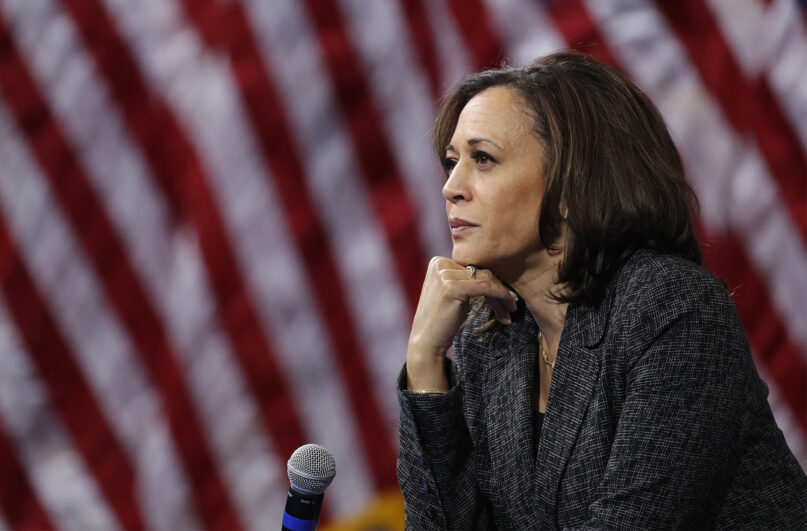(RNS) — What does it sound like when multiple glass ceilings shatter simultaneously?
Sen. Kamala Harris is the first Black female nominee for vice president, and the first Asian American and the first South Asian to be nominated to any presidential ticket.
Racial and ethnic identities aren’t the only complex identities she brings to the table: Harris is a Black Baptist, her husband is Jewish, her mom a Hindu.
Harris embodies some of the most marginalized racial and religious identities in American society, and this is progress. For the first time in history, we could have a vice president who knows firsthand what it means to be on the other side of racism, sexism and religious privilege.
RELATED: 5 faith facts about Biden’s VP choice Kamala Harris — a Black Baptist with Hindu family
Achieving representation is an important step, but we must not delude ourselves into thinking that electing a Black woman as vice president will lead to our country’s liberation from racism.
This is the mistake many of us made when we announced that President Barack Obama’s election signaled the end of racism in America. It is clear now that racist hate had only been forced into cover. It was lurking in the shadows, waiting to infiltrate the White House the moment Obama made his exit.
Representation matters — but representation itself is not enough.
Oftentimes, we conflate representation as the endpoint: “If we could just have more Sikhs in film,” I would tell myself, “then people would be more tolerant and less racist.”
This is true to an extent, and this is why representation does make a difference. Representation helps us look beyond flattened stereotypes to see the full humanity of diverse communities. Representation helps ensure that diverse experiences and communities are accounted for in our political processes.
But would having more Sikhs in movies eradicate the racism we deal with? Certainly not. We must do much more work and reach far deeper to get to the root of these issues. Racism is entrenched, systemic and institutionalized.
This is also why Harris’ nomination for vice president is an opportunity. At a time when our country is grappling with racial injustice, Harris has the chance to revisit some of her own participation in systemic racism as a prosecutor and attorney general for the state of California.
With our current focus on racial injustice and with our increasing awareness of how the criminal justice system disproportionately harms people of color, Harris has to show the moral courage to address her own role in perpetuating this system. Doing so will model for the rest of the country what it looks like to own one’s missteps with humility, honesty and grace.
There is one case in particular that she ought to address. In 2011, Attorney General Harris argued in a Sacramento County Superior Court that a Sikh named Trilochan Oberoi could not serve as a prison guard with his beard intact. Civil rights organizations argued vehemently that Harris’ position violated constitutional guarantees of religious freedom — to no avail.
Months later, after the federal Department of Justice’s civil rights division began an investigation into the issue, Oberoi settled an employment discrimination lawsuit with the state of California. Under the terms of the agreement, California did not have to change its discriminatory policy.
People change and grow over time, and I would love to see Harris come forward and admit that her arguments in this case were wrong and misguided. I would love for her to say that she no longer believes that Sikhs should be barred from a job because of their religious appearance.
I would especially love for her to show us all what it looks like to own our mistakes and demonstrate progress. That Harris proudly holds out her Black and South Asian identities is not enough: She should also announce a plan to address religious discrimination and criminal justice reform issues that remain embedded in our institutions and policies.
This, to me, would be the difference between playing representational politics and engaging in sincere, transformational change. One calls on us to bring forward those who have been hidden in the background for far too long; the other calls on us to embrace vulnerability, grapple with our own participation in systemic discrimination and find ways to do better.
Both approaches are important. If Harris is able to bring both to bear, she might just lead us all into unprecedented territory.






